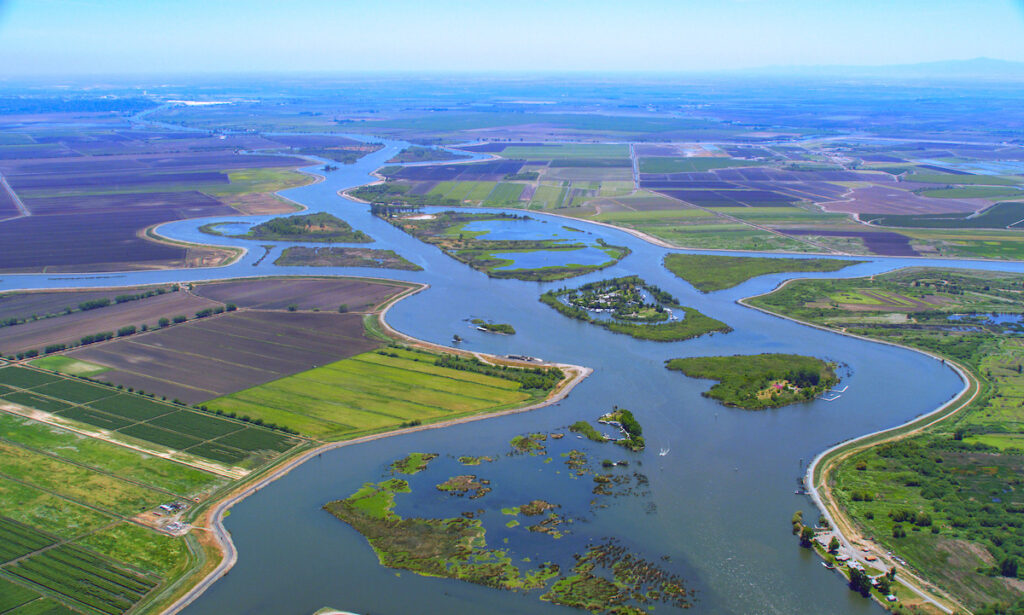The interplay between conservation policies and human security has become increasingly contentious, especially in regions where ecosystems and livelihoods are deeply intertwined. California’s current wildfires, falsely blamed on environmental regulations, and conservation efforts in delta regions, such as those protecting the delta smelt, exemplify this tension. These debates reveal a broader challenge: how to balance the urgent need for environmental preservation with the socio-economic realities of affected populations.
This issue is not unique to California. As someone researching the Danube Delta, I see striking parallels. From California to Romania, the struggle to harmonize conservation with human security highlights the importance of inclusive and scientifically informed policies.
The Human Cost of Conservation: Delta Communities in the Crossfire
In California, measures to protect species like the delta smelt have drawn criticism for diverting water from agricultural use to ecological restoration. While these policies are critical to preserving biodiversity and preventing long-term environmental collapse, they have significant socio-economic impacts. Farmers and local communities dependent on water-intensive agriculture often find themselves at odds with these regulations, feeling marginalized in the decision-making process.
This narrative resonates with challenges in Romania’s Danube Delta. Efforts to protect biodiversity, including restrictions on fishing or infrastructure development, can disrupt traditional livelihoods. Many fishermen in the Delta rely on these ecosystems not just for income but as a way of life. When conservation policies are perceived as one-sided, they breed resentment, undermining their effectiveness and creating divisions between conservationists and local communities.
A key lesson from both regions is that community engagement must be central to conservation efforts. Policies crafted without the input of those most affected risk alienating the very people needed to ensure their success. Solutions should combine ecological preservation with socio-economic support systems, such as subsidies for sustainable practices or eco-tourism initiatives that empower local populations.
California’s Wildfires: Debunking the Myths
California’s devastating wildfires are often misleadingly attributed to environmental regulations, such as restrictions on logging or water diversions for species like the delta smelt. This narrative, propagated by some political leaders, distracts from the root causes of these fires: climate change and poor forest management. Rising global temperatures, prolonged droughts, and erratic weather patterns have created a perfect storm for frequent and intense wildfires.
This false discourse undermines conservation efforts annd erodes public trust in scientifically informed policies. By scapegoating environmental protection measures, policymakers divert attention from the urgent need for climate action. Worse, such rhetoric can perpetuate opposition to conservation initiatives in other regions, such as delta ecosystems, where preserving biodiversity is equally critical.
Connecting Parallels Through My Fulbright Proposal
My Fulbright research focuses on the Danube Delta, a region where climate change exacerbates vulnerabilities such as habitat loss, food insecurity, and forced migration. This work has direct relevance to California’s conservation challenges. Upon completing my research in Romania, I plan to pursue a comparative study on the Sacramento-San Joaquin Delta. Both regions face threats from climate change, including altered precipitation patterns and ecosystem degradation, which ripple into socio-economic instability. The insights gained in Romania will provide a framework for understanding how conservation policies can mitigate vulnerabilities while ensuring the resilience of delta communities worldwide. These parallels highlight the universal nature of the struggle to harmonize environmental preservation and human security in vulnerable ecosystems.
The Intersection of Fire and Water: A Broader Perspective
The connections between California’s wildfires and conservation challenges in delta regions are not immediately obvious but share a common thread: the tension between environmental protection and human security. Both situations are exacerbated by a polarized discourse that pits ecological preservation against economic well-being.
This oversimplified framing ignores a critical truth: protecting ecosystems is essential to long-term human security. For example, failing to conserve California’s water systems or the Danube Delta’s wetlands can have devastating consequences for agriculture, fisheries, and local economies. Conversely, excluding local communities from conservation efforts risks creating policy failures that harm both people and the environment.
Pathways to Balance Conservation and Human Security
The key to resolving these tensions lies in integrative approaches that recognize the interdependence of human and environmental health. Some actionable solutions include:
1. Community-Based Conservation: Policies must include the voices of those most affected. In delta regions, this means collaborating with fishermen, farmers, and local leaders to design measures that balance ecological and economic needs.
2. Combatting Disinformation: Public education campaigns are essential to dispel myths about wildfire causes and the role of conservation policies. These campaigns should emphasize the scientific consensus on climate change and the importance of biodiversity preservation.
3. Adaptive Management Practices: Technologies such as AI and GIS can help create flexible water and land management systems that account for changing ecological and socio-economic conditions.
4. Resilience-Building Investments: Governments must support vulnerable populations by providing subsidies for sustainable livelihoods, creating alternative income streams like eco-tourism, and ensuring access to resources for climate adaptation.
A Personal Reflection: Bridging the Divide
As a Romanian-American currently conducting research in the Danube Delta, I am continually struck by the universal nature of these challenges. Whether in the arid landscapes of California or the wetlands of the Danube, the need for balance between conservation and human security is clear. It requires collaboration, innovation, and, above all, a commitment to both ecological and human well-being.
By learning from these shared experiences, we can move toward solutions that not only protect the environment but also empower communities to thrive within it. The stakes are too high to allow false narratives or short-sighted policies to dictate the future of our ecosystems, and the people who depend on them.
Reference
Jones, Benji. “Why does Trump hate this tiny fish so much? As Los Angeles burns, President-elect Donald Trump is yelling at a fish.”Vox, January 10, 2025. Retrieved from https://www.vox.com/down-to-earth/394283/los-angeles-wildfires-trump-newsom-delta-smelt

